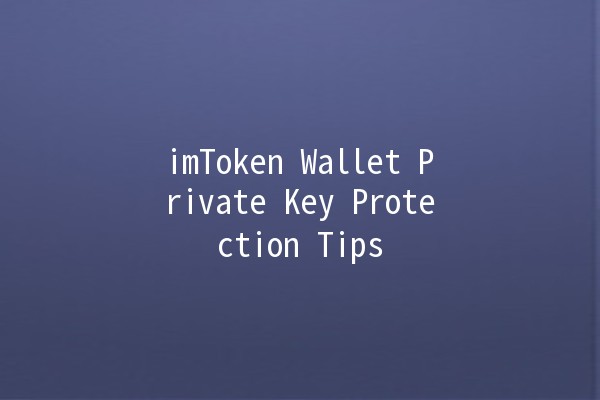In the rapidly evolving world of digital currencies, the importance of protecting your private keys cannot be overstated. The private key is your access point to your cryptocurrency assets, and if compromised, it can lead to irreversible losses. Below are five practical tips to enhance your private key protection while using the imToken wallet.
Creating a robust password is your first line of defense against unauthorized access. A strong password typically includes a mix of uppercase letters, lowercase letters, numbers, and special symbols. Additionally, enabling TwoFactor Authentication (2FA) adds an extra layer of security.
For instance, instead of using "123456" or "password", opt for something like "C0mplex!P@ssw0rd2023". Furthermore, set up 2FA through an authenticator app like Google Authenticator or a hardware security key. This way, even if someone gains access to your password, they would also need the second factor for authentication, which significantly reduces the risk of unauthorized transactions.

Backing up your private key is crucial in case you need to recover your wallet. However, it’s essential to do this in a secure manner to prevent exposure to potential threats.
Write down your private key on paper and store it in a safe place, such as a safe deposit box. Avoid saving it digitally on your computer or cloud services, as these can be vulnerable to hacking. You can also use a hardware wallet designed for secure backup solutions. Additionally, consider using encrypted USB drives as a secure backup method.
Phishing attacks are designed to trick users into revealing sensitive information by masquerading as legitimate entities. These can occur through emails, websites, or even messages.
Always doublecheck the URLs of websites before entering your login details. For instance, ensure that you are visiting the official imToken website and not a lookalike domain. Additionally, never click on links from untrusted emails or texts claiming to be from imToken. If in doubt, navigate to the official site directly rather than through a link.
Developers routinely release updates to address security vulnerabilities and enhance the security features of the wallet. Keeping your app updated ensures that you have the latest security patches.
Make it a habit to check for updates weekly or automatically update your app through the app store settings. Additionally, reviewing the release notes of updates can inform you about new security features that you can utilize to further protect your wallet.
If you frequently make transactions, consider using a separate wallet for everyday transactions while keeping your larger assets in a more secure, less frequently accessed wallet. This reduces the risk of losing your entire holdings due to a single incident.
You might use a separate imToken wallet for small amounts of cryptocurrency that you need for regular transactions, while keeping the bulk of your holdings in a more secure wallet with limited use. This way, even if the smaller wallet gets compromised, your larger assets remain safe.
A private key is a unique string of numbers and letters that allows you to access and manage your cryptocurrency. It is crucial for signing transactions and providing proof of ownership. Without it, you cannot access your funds.
To keep your private key safe, avoid sharing it publicly, and store it in a secure physical location. Utilize hardware wallets, and regularly back it up. Employ strong passwords and enable 2FA for additional protection.
If you lose your private key, you will unfortunately lose access to your cryptocurrency stored in that address. Always ensure you have backup methods in place, like writing it down and keeping it safe, to avoid such situations.
No, recovering your wallet without your private key is impossible. The private key is the only thing that enables you to access your funds. Make sure to have it backed up securely.
It is recommended to change your passwords every three to six months. Doing so regularly reduces the risk of unauthorized access, especially if you suspect any security breaches.
It is generally not safe to store your private key on your computer because it can be exposed to malware and hacking risks. Always prefer physical storage options, like writing it down or using secure hardware wallets.
By implementing these techniques and practices, you can significantly enhance the protection of your private keys. Always stay vigilant and informed about the best security practices to safeguard your digital assets in the constantly changing landscape of cryptocurrency.